The Top 10 Types of Countertop Materials for Your Home
The perfect countertop material helps you customize your home and add functionality


When you first start countertop shopping, it’s easy to get caught up in pretty colors and designs. Aesthetics are important, but practicality should also drive the search. You’ll need to consider your dream design, budget, and time spent using counters to pick the best countertop materials for your home. There’s no one-size-fits-all solution for matching types of countertops to your kitchen and bathroom, but let’s break down some choices that meet most buyers’ standards.
1. Granite

A go-to for decades, granite adorns millions of countertops because of its durability and style. Granite is a heat resistant natural stone that you can clean with soap and water. You’ll need to apply a protective sealant every so often because of its porosity. The average cost of granite countertops is $3,250.
Granite slabs come in various colors, often with flecks of complementary colors inside. If you hire a professional countertop installer near you, they can cut the granite’s edges (square, beveled, ogee, or half and full bullnose) for a custom look.
Pros
Heat-resistance—no need for a trivet
Each slab has a unique pattern and look
More desirable, so it can attract buyers and add resale value
This material has a long life span, and resurfacing can lengthen it
Cons
Requires regular sealing due to porosity
Less durable than engineered stones
Repairs are difficult, particularly if you need to match the finish
Difficult installation—not an easy DIY
2. Quartz
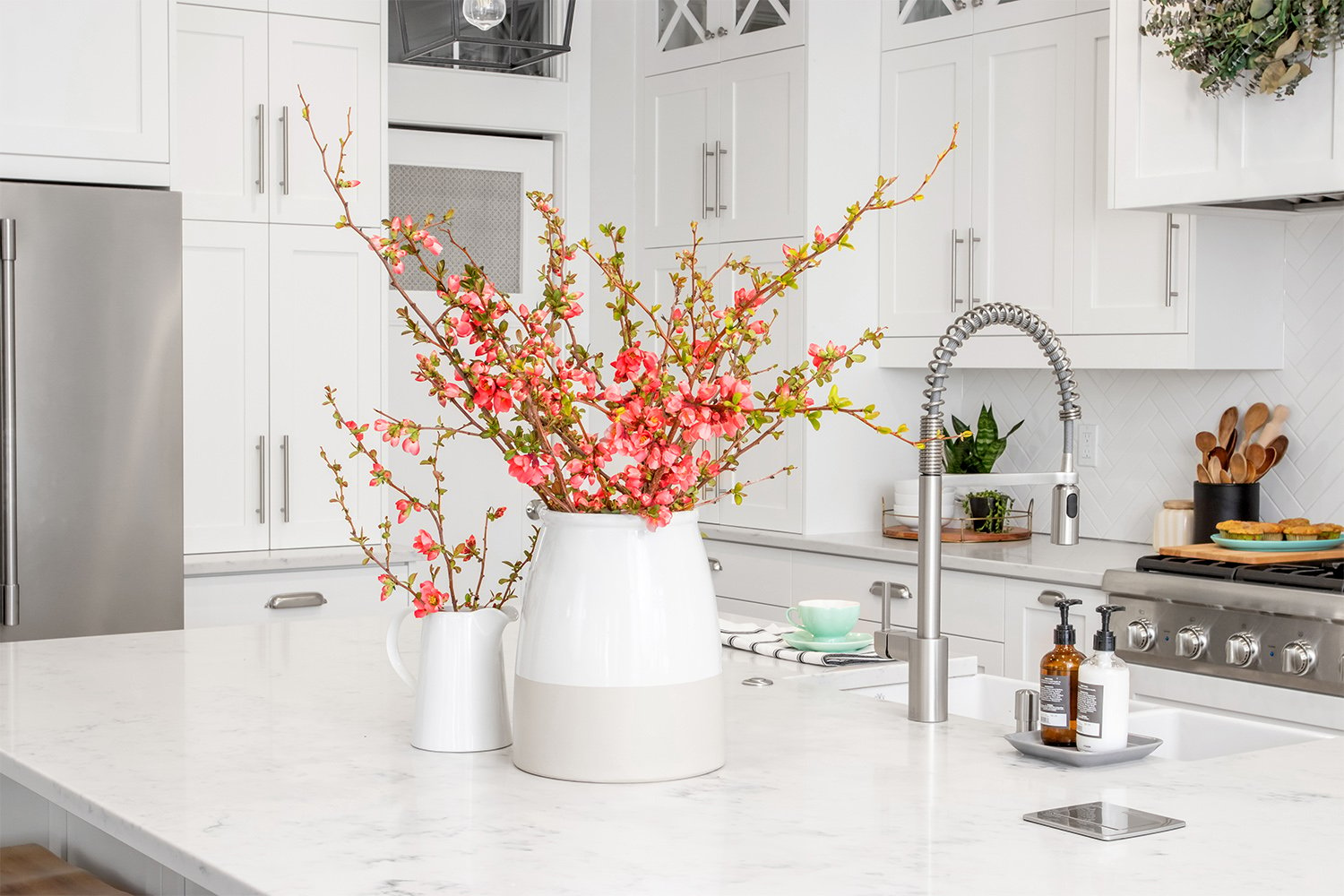
Quartz countertop prices range from $3,000 to $7,500. Quartz attracts a wide variety of fans, especially home cooks. When comparing quartz to granite, quartz is actually more durable while still providing the sought-after look of natural stone. They’re extremely hard, so watch your knife blades.
Some kitchen countertops are better suited for specific households. For example, if you have children and frequent spills happen, choose a nonporous material like quartz. A countertop installer can help you decide how durable the counter needs to be for your kitchen.
Quartz countertops consist of composite stone derived from quartz and added to a resin binder. It’s nonporous, so there’s no need for a sealant. Another quartz countertop bonus: Before installation, you can add colorants and change the shine finish from matte to highly polished. You can even choose from a variety of countertop edges, just like you would for a natural stone slab.
Pros
Highly durable (even more than natural stone)
Nonporous, so it’s easy to clean and maintain
Many manufacturers offer extended warranties
Enough options to suit any home design
Cons
High cost, even compared to some natural stones
Installation is difficult because it’s so heavy
Vulnerable to heat damage
Vulnerable to UV damage, so it’s not suitable for outdoor use
3. Marble

Everyone loves marble countertops for their pretty, clean, white color with veins of blues, grays, and greens. But it also comes in other primary colors, such as gray and taupe.
Hobbyist bakers and professionals prefer marble countertops because they keep a low temperature perfect for pastry dough. However, everyday homeowners might have trouble with marble’s tendency to absorb liquids that quickly stain—so you might want to pour your red wine over the sink. Also, invest in a collection of cutting boards because marble scratches unless you purchase a slab with technologically-advanced sealants. The average cost of a marble countertop is $3,000 for 50 square feet.
Pros
Attractive and unique veining
Lots of design options
Maintains value more than other natural stones like granite
Long life span—can last up to 100 years
Cons
High cost, especially with rarer stones
Requires regular sealing due to porosity
Not totally heat resistant
Can etch and scratch despite relatively high durability
4. Stainless Steel

You’ve probably seen stainless steel countertops on cooking shows. They’re traditionally one of the best countertop materials for commercial kitchens, but as of late, stainless steel has found its way into homes because it instantly invokes the industrial aesthetic that’s oh-so-popular.
Stainless steel counters are also nonporous, long-lasting, and need only soap and water for cleanup (unless you’d prefer a solution specialized for stainless steel). But take note: you will notice everyday fingerprints, dents, and scratches. Stainless countertops cost $4,500 for 30 square feet.
Pros
Relatively easy to install
Easy to clean (though you should use gentle cleaners)
Impervious to stains, since it’s nonporous
You can recycle your countertop at the end of its life span
Cons
High upfront costs
Susceptible to dents and scratches
Lack of color and design options
Shows fingerprints and can streak
5. Laminate

If talking about laminate countertops makes you think of your grandma’s kitchen, you're not alone. Laminate countertops were exceptionally popular about 30 to 40 years ago because they were stain resistant, inexpensive, and didn’t require maintenance. But they weren’t the most attractive choice (think harvest gold and avocado green countertops).
While countertop shopping, don’t discount today's laminate options; they’ve vastly improved and are wallet-friendly. The average laminate countertop installation costs between $850 and $1,750.
Now, laminate countertops mimic high-end choices like natural stone or even wood. Laminate could be the perfect choice for a budget-friendly countertop in kitchens and bathrooms or high-occupancy rentals. But, like everything, there are pros and cons to laminate countertops. For instance, heat is laminate’s kryptonite. Always use a trivet or pot holder to prevent burning the surface.
Pros
One of the most wallet-friendly countertop materials
Stain-resistant and low-maintenance
Nearly unlimited color and design options
DIY-friendly
Cons
Vulnerable to water and heat damage
Difficult (if not impossible) to repair
Shorter life span than other materials
Low durability compared to other materials
6. Soapstone

Soapstone gets its name from its feel—it’s soft like a bar of soap because of the talc in its composition. Soapstone scratches more easily than granite or quartz, but it’s less likely to crack or have serious damage. It also needs monthly maintenance during its first year to achieve the unique patina homeowners covet.
One benefit of soapstone countertops is that they’re nonporous, meaning they’re resistant to stains, bacteria, and heat. But many homeowners choose soapstone because of its one-of-a-kind look. Soapstone has veins like marble; its main colors are blue, gray, and green. Soapstone also looks more lovely as it ages, thanks to the refined patina. Expect to pay between $2,700 to $4,200 for the price of a soapstone countertop.
Pros
Less likely to crack than other natural stones
Nonporous with antibacterial properties
Heat resistant
Relatively simple to install
Cons
Scratches more easily than other stones
High upfront costs
Limited colors and options
Requires regular oiling
7. Butcher Block or Wood

You’ve probably seen butcher block countertops all over Pinterest, Instagram, and kitchen design blogs. Butcher block's charm and warmth are perfect for the heart of the home. Homeowners also love it because it's cost-effective and highly customizable; you can choose from many wood sources like oak, walnut, cherry, and maple, in addition to an assortment of stain colors to match your kitchen.
Butcher block is porous, so you’ll need to seal it to prevent water damage, stains, and bacteria. The average cost of butcher block counters is $3,750.
Pros
Cost-effective compared to other types of countertop materials
Simple to repair or resurface
Long life span with proper maintenance
Versatility, with tons of different wood options
Cons
Prone to scratches (especially if used as cutting board)
Not heat resistant—hot pots can leave scorch marks
Requires monthly sealing
Susceptible to stains since it’s porous
8. Concrete

If you’re always keeping up with the latest trends, consider a concrete countertop idea for your kitchen or bathrooms. Concrete countertops are more popular than ever and offer benefits that other materials don’t. If you’re into DIY projects, you can purchase a kit and install it by the weekend. Or, hire a professional and pay the average concrete countertop installation cost—between $5,000 and $10,000.
As you can guess, concrete countertops have pros and cons, too. They’re exceptionally durable, resist chipping, and you can even color the concrete to ensure you have a unique feature in your home. But concrete can crack if the corners bear too much weight or the house shifts or settles, though the repairs are relatively easy. You will also have to seal the concrete regularly to make it easy to clean and resistant to stains.
Pros
Can last decades with proper maintenance
Highly customizable
Highly heat resistant
Minor damage is easy for a pro to repair
Cons
Highly susceptible to staining
Prone to cracking and chipping
High installation costs
Heavy and may require cabinet reinforcement
9. Solid Surface
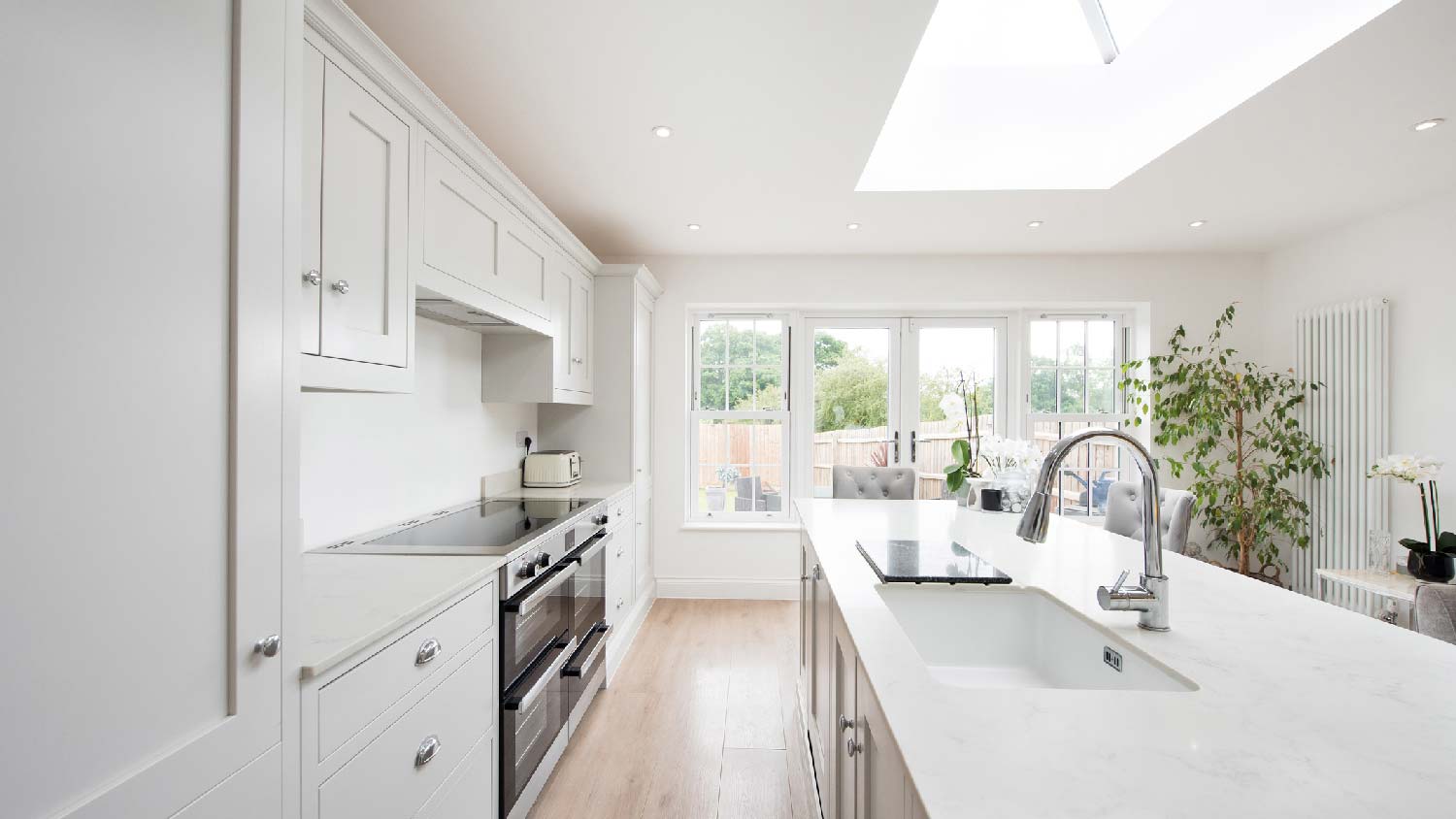
You might know solid surface countertops as manufactured stone. People also commonly refer to them as Corian® countertops, even though that’s a brand name (call it the Xerox or Kleenex effect). This type of countertop consists of a mix of acrylic-based or polyester resin, mineral dust, and pigment. DuPoint originally introduced solid surface in 1967 as an alternative to stone; today, it’s a modern staple available from numerous brand names.
The big draw to solid surface countertops is that they’re usually more budget-friendly than natural stone. Most solid surface countertops cost between $1,500 and $9,000. The average Corian® countertop costs around $4,000.
Thanks to being a manufactured material, these countertops have a virtually seamless look. You can even choose waterfall edge. It’s also got a huge range of options, but fair warning, solid state countertops are not heat resistant.
Pros
Less likely to crack and chip than natural stone
Nonporous, so it’s water- and stain-resistant
Very low maintenance
More affordable than other countertop types
Cons
Vulnerable to heat and UV damage
Difficult to DIY
Has less resale value than higher-end types of counters
Vulnerable to scratches and etching
10. Tile
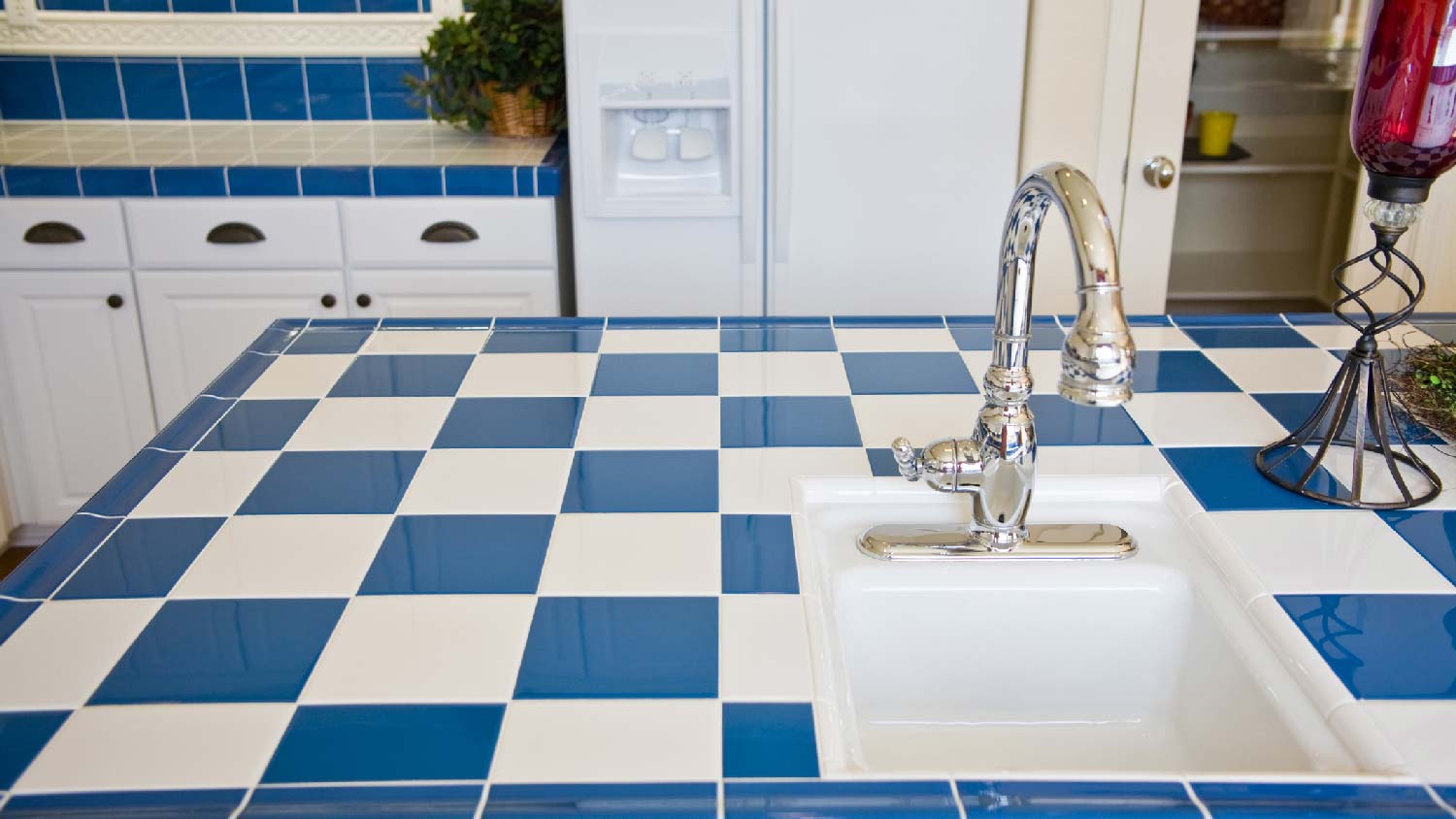
Tile countertops may seem like a relic from the 1970s, ‘80s, and ‘90s, but this vintage look is making a true comeback. It’s particularly popular in bathrooms, but it’s also one of the best countertops for kitchens if you want a Mediterranean or rustic look. Trendy homeowners have even gravitated towards hexagonal tiles that feel both fresh and exciting.
Though most tile countertops are either porcelain or ceramic, you can also find natural stone tiles made from granite, quartz, or marble. These are significantly less expensive than a natural stone slab. For example, granite tile for countertops costs $20 to $25 less per square foot than modular pieces of the same material. A typical porcelain tile installation costs $1,930, which is much more cost-effective than other countertop options.
Pros
Budget-friendly, especially compared to natural stone slabs
Heat resistant (though you should still use a trivet)
Tons of different tile options, designs, mosaics, finishes, and textures
Easy to fix—just swap the damaged tile
Cons
Difficult to clean
Grout can stain and foster bacteria growth
Tile can chip or crack
Textured finish—it’s not smooth like a slab
Which Countertop Material Is Best for You?

The best countertop for your kitchen or bathroom really depends on your overall goals. For example, laminate may be budget-friendly, but some homeowners prefer a higher-end look. Similarly, depending on your cooking habits, you may need something more scratch or heat resistant. This chart helps break down your options.
| Category | Type of Countertop |
|---|---|
| Best for Budget | Laminate, Tile |
| Most Versatile | Laminate, Granite |
| Best for Overall Durability | Quartz, Granite |
| Most Stain Resistant | Quartz, Stainless Steel |
| Most Heat Resistant | Stainless Steel, Granite, Ceramic Tile |
| Most Scratch Resistant | Concrete, Quartz |
| Easiest to Repair | Tile, Soapstone |
| Trendiest | Butcher Block, Concrete |
| Best to DIY | Laminate, Tile |
| High End | Marble, Concrete, Stainless Steel |
Cost to Install a Countertop
Installing a countertop usually costs between $1,840 and $4,385, but it can range from $400 to $10,675, depending on the size of the job and the material you choose. On the low end, ceramic countertops can cost between $1 and $15 per square foot, while natural stone can cost upwards of $70 per square foot. Measure the area you’re working with to more accurately estimate the cost of installing your countertops.
DIY vs. Hiring a Pro
Since installing countertops requires experience and several specialized tools, this isn’t a DIY project for most homeowners. However, if you have plenty of experience with similar projects and a few friends to help—countertops can weigh over 200 pounds!—you can save between $10 and $30 per square foot by doing it yourself. For most people, it’s worth the labor cost to hire a local countertop installer and save yourself the trouble (and the backache).
Becca Lewis contributed to this article.



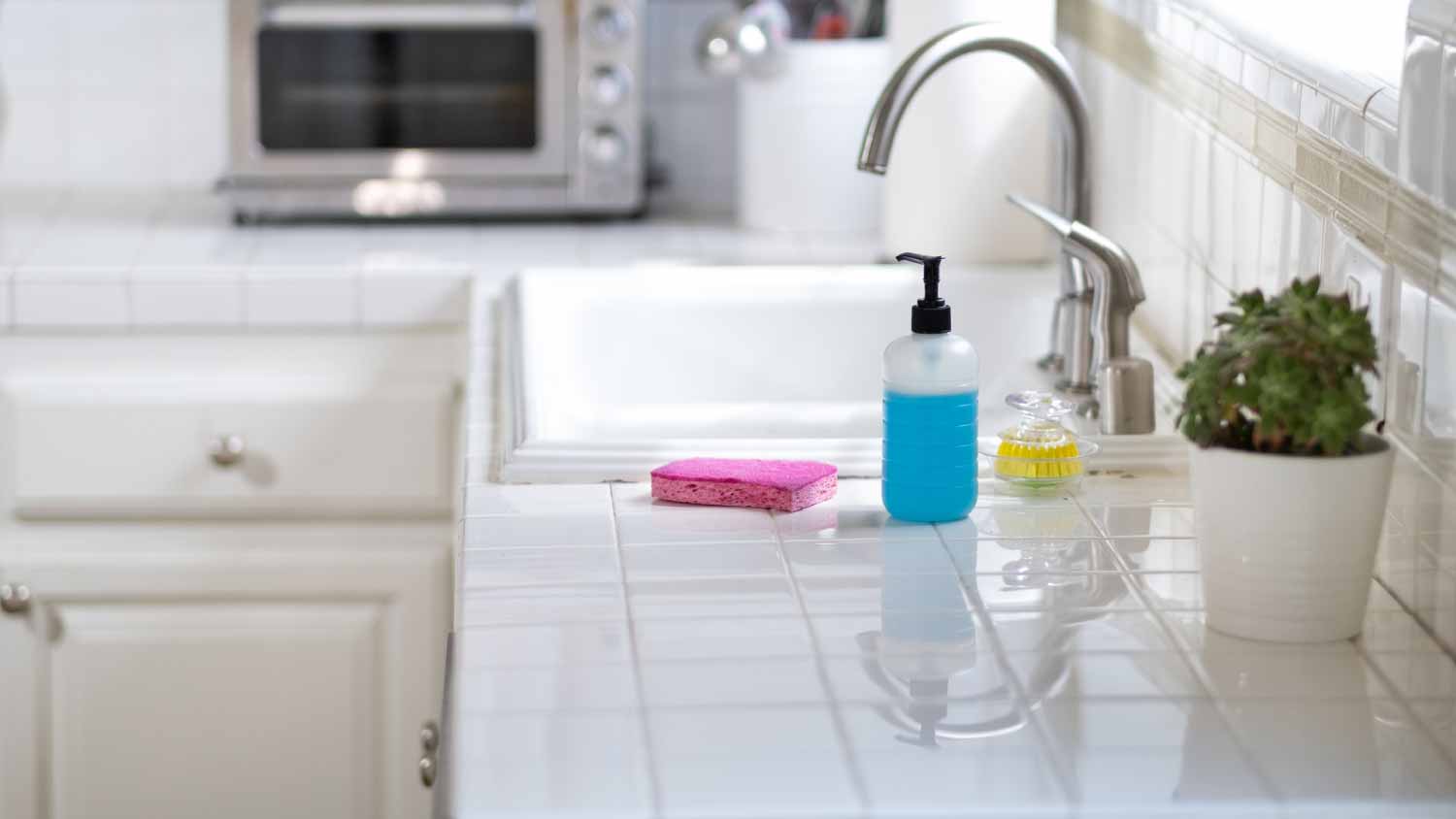
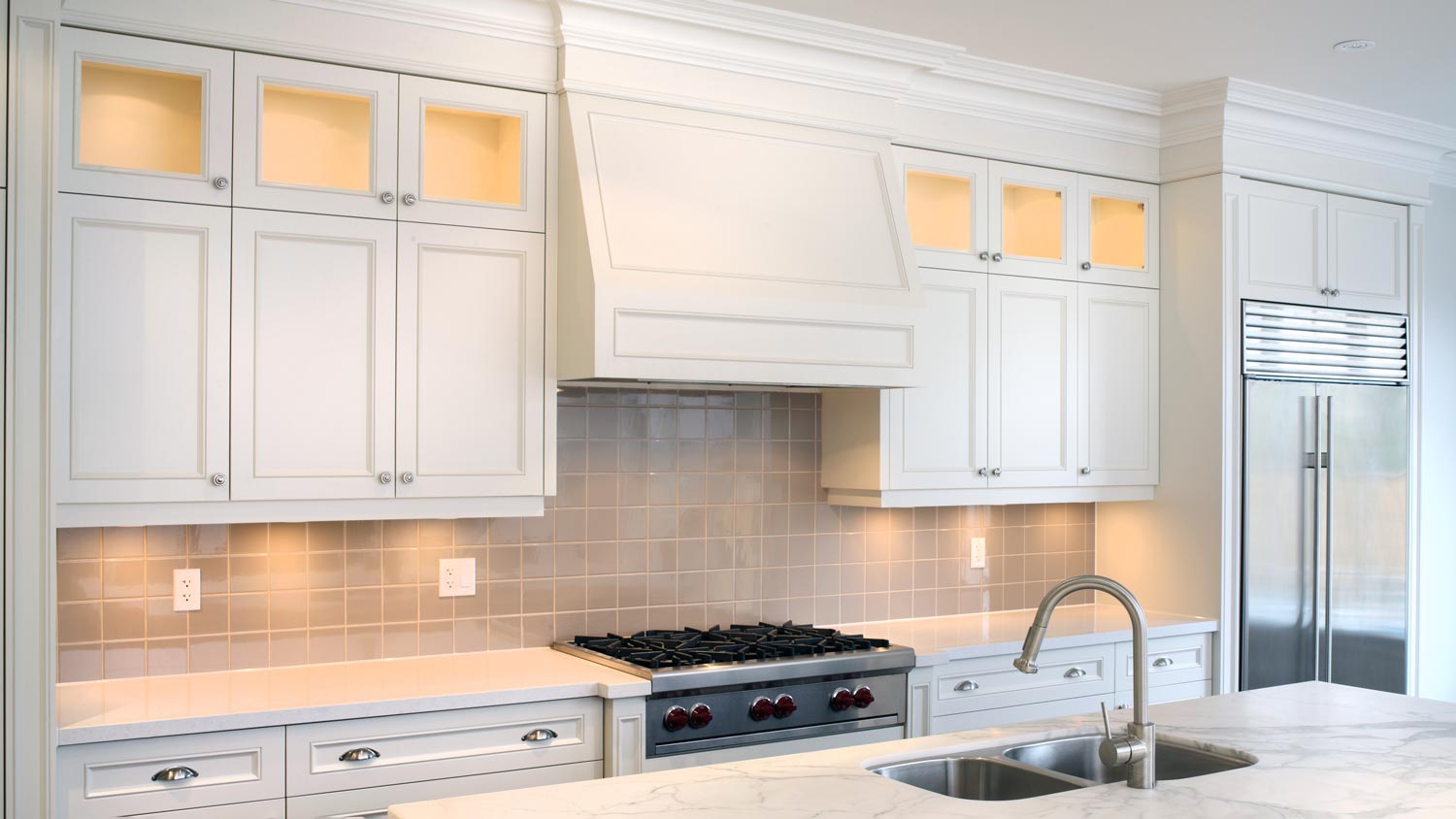
- 9 Low-Maintenance Countertops to Make Your Kitchen Shine
- The Top 7 Types of Stone Countertops for Your Kitchen
- 17 Beautiful Granite Countertop Alternatives
- 23 Kitchen Countertop Ideas to Fit Any Style
- 10 Affordable Kitchen Countertop Ideas You’ll Love
- 11 Unique and Unusual Kitchen Countertop Ideas
- 7 Types of Bathroom Countertop Materials to Upgrade Your Space
- How to Get Stains Out of Different Types of Countertops, From Quartz to Concrete
- 6 Nonporous Countertops to Consider for Your Kitchen
- How to Cut Countertops for a DIY Kitchen Reno
















